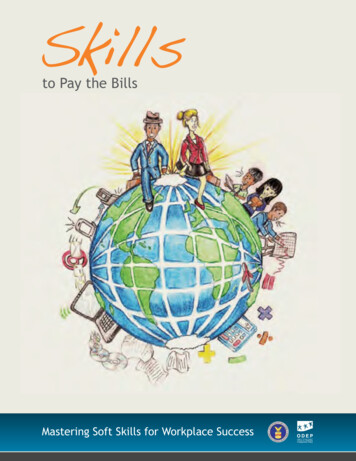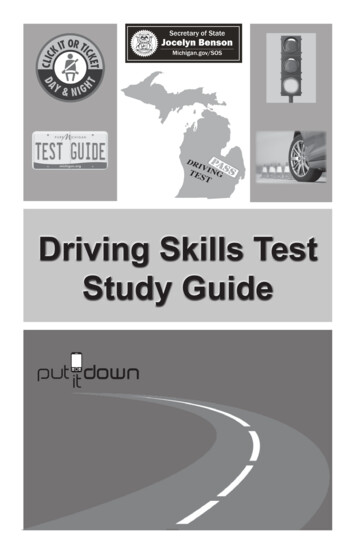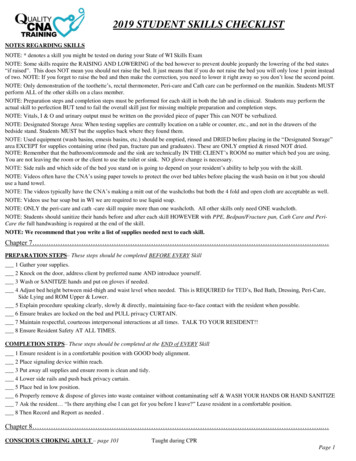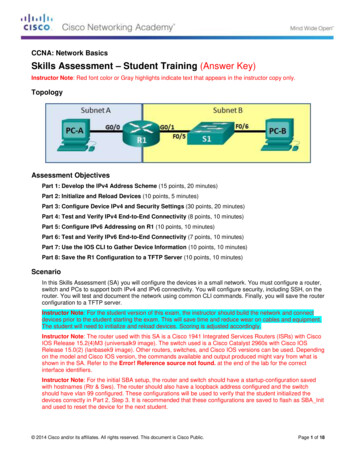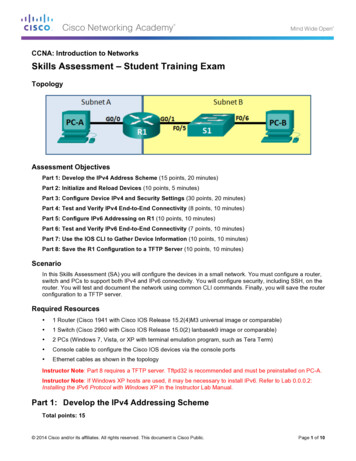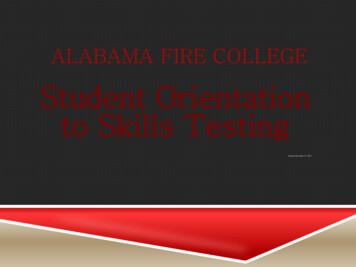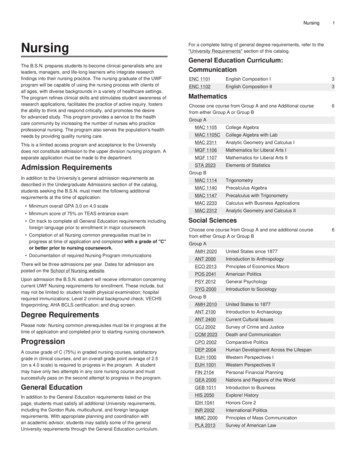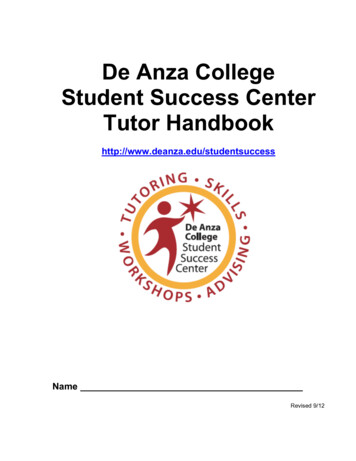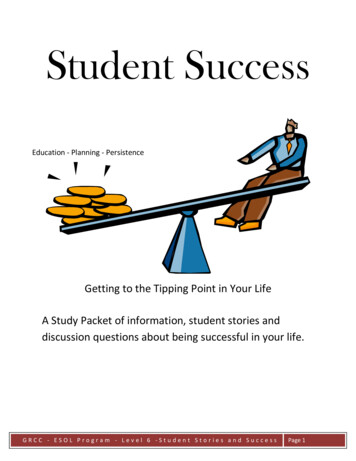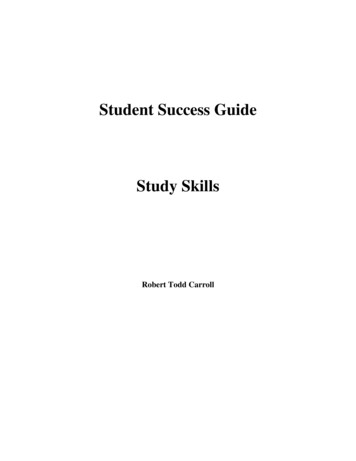
Transcription
Student Success GuideStudy SkillsRobert Todd Carroll
Student Success Guide – Study Skills 1990 by Robert T. Carroll. All rights reserved.No part of this book may be reproduced in any form or by any means, includingelectronic storage and retrieval, or translated into a foreign language without prioragreement and written consent from the author as governed by United States andInternational Copyright Law.Robert Todd Carrolle-mail: rtc@skepdic.comWebsite: The Skeptic’s Dictionary (www.skepdic.com)Other books by Robert T. Carroll The Common-Sense Philosophy of Religion of Bishop EdwardStillingfleet, 1635-1699. (1975). (International Archives of the History ofIdeas / archives internationales d'histoire des idées). Martinus Nijhoff, TheHague Student Success Guide: Writing Skills .pdf The Skeptic’s Dictionary: A Collection of Strange Beliefs, AmusingDeceptions, and Dangerous Delusions. (2003). Wiley and Sons. Becoming a Critical Thinker – A Guide for the New Millennium. (2005). 2ndedition. Pearson Custom Publishing.Chapter One available online athttp://www.skepdic.com/refuge/ctlessons/ch1.pdf
PrefaceThe purpose of the Student Success Guide: Study Skills book is to provide a systematicapproach to learning the skills needed by every successful student: skills such as vocabularybuilding, time management, listening and concentration, reading and studying textbooks, takingnotes, reviewing and preparing for tests.The Student Success Guide may be used independently by the student who wishes toimprove his or her chances of success in humanities and social science courses. The book couldalso be used as the sole text in a Study Skills course or as an adjunct text in an English orHumanities course.The driving idea behind the Student Success Guide is that methodical and purposivestudying is the most effective and efficient. I don't claim that my method is the only one. In fact, Ican't even call it my method, since very little of it has been originated by me. I have taken thework and suggestions of many people and applied them as I saw fit. What has resulted is a workunified by the idea that purpose, method, practice, and a way of measuring achievement arecentral to any effective and efficient learning.The Student Success Guide is easy to use and understand, but it does not make studyingeffortless. Any method which promises amazing results but requires no work is a sham. I can'tpromise that if you follow the program here you will be able to learn Mandarin Chinese in a weekduring your sleep (as one text I reviewed promised!). The successful student will have to workhard. If you do, I can promise that you will not be uncertain about the payoff for the work put in. Ithas been said before, but it bears repeating: you will get out of it what you put into it.Robert T. CarrollSacramento City CollegeMarch 1990Acknowledgment and dedication. For the first half of my teaching career at Sacramento CityCollege I was fortunate to have had Les Read as my colleague in the philosophy department. Leswas one of my closest friends until his sudden death at age 48. Ed Stupka—who taught collegesuccess classes—Les, and I spent many fruitful hours discussing, arguing, and evaluatingvarious teaching techniques and ideas. Without their insights and criticisms, this guide would nothave been written.The Los Rios Community College Board of Trustees granted me a sabbatical leave in thespring of 1986 to complete this project.ii
TABLE OF CONTENTS1411Two EssentialsVocabularyMotivation13Study 48484849Time BudgetingConcentrationListeningReading and StudyingReading Skills/Effective StudyingTextbook OrientationPreviewing Textbook ChaptersFocused Reading: The Structure of a ChapterFocused Reading: Types of QuestionsThe Language of QuestionsTaking NotesTaking Notes: Marking Your TextTaking Note of RelationsUsing a NotebookTaking Visual Notes: MappingTaking Notes in ClassCritical Reading & Note takingReviewingMemoryDeclarative MemoryProcedural MemoryReviewing DailyTaking TestsPreparation for Taking TestsKinds of TestsReading Testsiii
INDEX OF 5.6.7.Vocabulary CardsVocabulary: PrefixesVocabulary: 14 Master WordsVocabulary: Building Words from PrefixesVocabulary: Building Words from RootsVocabulary: Combining Prefixes and RootsVocabulary: Prefixes and RootsIndependent Activities: Vocabulary Building8. Motivation9. Time Management10. Concentration11. Listening12. Textbook Orientation13. Previewing a Textbook Chapter14. Focusing on the Structure of a Chapter15. Identifying Types of Questions16. Anticipating Questions After Previewing17. Anticipating Questions: Making Study Cards18. Anticipating Questions: Marking Your Book19. Taking Notes: Marking Your Text20. Taking Note of Relations21. Using a Notebook22. Mapping23. Taking Notes in Class:Paragraphs, Maps & Key Phrases24. Taking Notes in Class:Paragraphs, Maps & Questions25. Taking Notes in Class: Emphasis on Mapping26. Critical Reading: Questions & Comments27. Memory:Acronyms, Nonsense Sentences & Visualization28. Memory: Visual Connections29. Reviewing a Text Book Chapter30. Reviewing Lecture Notes31. Reviewing Text Notes32. Skimming Your Text for Review33. Skimming Your Text Notes for Review34. Skimming Your Lecture Notes for Review35. Preparing for Tests36. Taking Testsiv
Two Essentials: Strong Vocabulary and MotivationThe good college student--the one who can read, write and study well--musthave an adequate vocabulary. Since a vocabulary cannot be inherited, it mustbe earned. We are all born equally ignorant in this respect: even the one withthe biggest mouth was born with no words.As you read for your college courses, you will find that at times you do notunderstand what the author means. Sometimes this will be due to poorwriting. Even the greatest thinkers sometimes write poorly. Very often, though,your lack of understanding will be due to your weak vocabulary or your lack ofbackground knowledge. In such cases, you may be tempted to throw up yourhands in disgust and quit reading. Alternatively, you might set aside the bookfor a while to do the research needed to understand the author. However, areasonable alternative would be to continue reading. Admit that you cannotunderstand this part of the book; but move forward, trying to understand asmuch as you can.If you cannot understand something in your text due to obscure writing ordue to lack of knowledge or experience, skip it and move on to what you canunderstand. Of course, before you begin reading an assignment, you shouldread any introductory material that your book provides. Also read anycomments, notes or outlines provided by the author or editor. Introductions,notes, comments, outlines and summaries can provide vital information. Theycan help you understand the meaning and significance of the material.Above all, keep a good dictionary at hand while you read. Of all the booksyou will purchase in your college career, none can be as useful as a gooddictionary. A good dictionary provides more than synonyms or lists ofmeanings; it will give examples of words used in sentences and describesubtle differences of closely related words. Not only should you look up themeaning of any word you do not know and which hinders your understanding,you should keep a notebook or card file of new and important words orexpressions and their definitions. Every day you should study your word list.Set a goal to learn one, two, five, or even ten new words a day or week.If, after having read the introductory material to a written work and afterlooking up unfamiliar words in your dictionary, you still do not understand asentence or passage, skip it. Don't worry about it any further. You have doneyour best. If, after finishing the whole reading assignment, you still think youshould understand a sentence or passage which you had to skip, ask yourteacher what it means or go to the library and do some research [seeAppendix A: Using the Library]1
Activity 1 - Vocabulary Cards!"# % &'( )&!&")&&&#&* ,-.,2
Activity 2 - Vocabulary: PrefixesDr. James I. Brown of the University of Minnesota put together a list of 14 words, which heclaims can be used to build a super vocabulary. Each of the 14 basic words consists of a prefixand a root. The 14 master words are: detain, intermittent, precept, offer, insist, monograph,epilogue, aspect, uncomplicated, nonextended, reproduction, indisposed, oversufficient,and mistranscribe.Since six of the words have two prefixes each, the list which follows consists of 20 prefixesrather than 14. Your task is to look up each prefix in a dictionary and write down its meaning.(Note: if your dictionary does not list prefixes, you need a better dictionary.) Alternative spellings ofthe prefixes are also given.The first one is done for you as an example. )*/01(7!; 5*602 *)6 )*68 .602 6- 8286* 06' 56 ?26@ 98 - 62826( *16)*67 )8 6! 02 6; 5036 8 A *)6 3? .6 - 036(@ )' 2 36' % *)2 ' * 3 *%%02 4- *' 2 02 48 96:8 /6:8 60- 6:0%6:0)6' 96:' 4 6:' %6:' 2 6' 6:' )6:' 36:' 698 6:98 %6:98 2 6:98 )6*6:*/60)6:0%6:0- 6506:50/63? )63? 6:3? 96:3? /6:3? 4 63? - 6:3? 6)' 2 6: )' 63
.7( 0% &- ' 3 *)8 )55* ' 0202 *)- 0)8 8' 02*28 B *) 3 *%%02 4 )8 8 C3 - *' 2 02 4' 2 : *2 : 02-0- 033:- 03:- 0 )*9* 9* 9' :9' :90 8 //*)02 303/*)303%' :%'3 ' :3 '- 8 2 8 4 )' B4 )' B* 0%8 4 ? *%8 4%8 4' 3 *93 *93 *9:3 0:3 ? 2 98 - %09' *5 %09 %*1: %2 8 2 *1 *2 5*5*2 5&D&&*2 3: *2)* )8 5? 9 08 25? 95? 9:5? 0 :5? F02 503 8 3*5 8 3 8 ? 2 5: 8 2 :8 A *)3? //090*2/09/' 9:/' 9 :- 03 )' 2 39)0.*39)0.*39)0A :39)0 :39)0.:39)0 4E&&E
Activity 3 - Vocabulary: 14 Master Words02 3 )? 9 08 2 3- ' 3 *)8 )58 )55* ' 02#% &(##?- *' 2 02 4"3*2 *2 9* ? 302 4&G02 *)- 0*2 )*9* 8 //*)02 303- 8 2 8 4 )' B* 0%8 4 ? *' 3 *9? 2 98 - %09' *52 8 2 *1 *2 5*5)* )8 5? 9 08 202 503 8 3*58 A *)3? //090*2- 03 )' 2 39)0.*5#B * - ' 3 *)
Activity 4 - Vocabulary: Building Words from Prefixes#/(##? )*/01(C2*8 )5 - *' 2 02 43*2 *2 9* ? 302 4 2 *5*68 )5,'&,E,B,,B,6
Activity 5 - Vocabulary: Building Words from Roots/7( #9(##?ROOT NEW WORD' 02 !MEANING&SENTENCE USING NEW WORD6',E,B,&,7
Activity 6 - Vocabulary: Combining Prefixes and Roots#97(##?(Use your own paper to complete this exercise. Some examples are given.)2*8 )5 - *' 2 02 43*2 *2 9* ? 302 4 2 *5*9*0A *,&&5*/*)"",,0#0,5*303E5*5? 95* 8 3*5*/0905*39)0.*88 )5
Activity 7 - Vocabulary: Prefixes and Roots#4&77(#9(@
Independent Activities - Vocabulary Building0&&&#" &( % -H&6&& "10
'('( )You may have a rich vocabulary, but it won't do you much good if your attitude towardstudying is poor. To be a successful college student, it is not enough just to want to besuccessful. Nor is it enough merely to have the skills necessary for success. Desire and skillare necessary, but they aren't sufficient. You will need motivation, also.WHAT IS MOTIVATION? Many people confuse drive or energy or commitment withmotivation. But, having a strong desire to learn, or putting a lot of energy into your studies, isnot the same as being a highly motivated student. Motivation has to do with setting goalsand moving toward them.Each of the following is essential to being a highly motivated student:1) Knowing what you want from college;2) Planning how to achieve what you want;3) Knowing what aids and hindrances there are to achieving your goals;4) Committing yourself to a plan of action which takes advantage of the aids and dealsintelligently with the hindrances; and,5) Coming up with a meaningful way to measure your successes, short term as well aslong term.Motivation, like vocabulary, is not something you are born with. You can develop andsystematically improve your motivation. In short, a motivated student has a purpose, a planand a yardstick. You must know what you want out of college, how to get it and how tomeasure your progress. It is as simple as that.11
Activity 8 - MotivationThe following activities are designed to help you focus on your purpose, plan and yardstick. Eachquestion should be answered in a careful, reflective manner.I(II7&I!I; BI5IB6&126I
*' *, (*A successful college student must possess a number of skills. You must be able to readand write well, to listen and take notes well, to concentrate and take tests well, to participatein class and manage time well. The better developed these skills are, the better able you willbe to achieve the goals you have set for yourself. Each of the following sections aims athelping you develop one or more of these skills.&G*G&&436"#0H0HB6@*&GHH5C5C"C9&HJ# 0&&Activity 9 - Time Management5&2.&6HC03&!"B#3H/HH13
Activity 9 - Time ManagementSUNMONTUES8 am9 am10 am11 am12 pm1 pm2 pm3 pm4 pm5 pm6 pm7 pm8 pm9 pm10 pm11 pm12 am14WEDTHURFRISAT
?8&C(@@BI3GC&0H&'4&H0CC0CG."B#/'15-
Activity 10 - Concentration( 3D'I5I 0IG-&C&.'0CC.&0&&&" &#&&&;2
0&0&&2I% .%.') .) ''. 04) .) '3& J6666&6'. /&/?&H''.) & C?&& C3'8& CD&& .&'&) & &
Activity 11 - Listening- &( - &D'18
READING AND STUDYING.&&&G&&&GG&&D&8D.H0#E&&(#&&&&/&#*G&0&!- ! /0#F&0&&"40&#BH&' /#G66.% !66.660&# &C6&.4D &.&&&19
"& "'C5&/-5&&D&&G/"3 &';6#/G)0 EE.&Activity 12 - Textbook Orientation&& )*/' 9*' .%* 8 / 98 2 *2 32 ? - .*) 8 / 9B ' *)3' 2 3 *)3 8 *1*)903*302 5*14 %8 33' )' *2 509*3.0.%08 4 )' B KK19
'(("0 %*&8I.I%'#6G"5'" #I#7I5! 04 %8 33' ); 0I&&02 5*1 && 0& 0&&& *G&II "9I# "I#9CI0I@ % &I0I"G#020
% . (.() 0 '.1 ',2 %'. *& D&& &&&Activity 13 - Previewing a Textbook Chapter 9& 02 )8 5? 9 8 ) 3*9 08 298 2 9%? 502 4 3*9 08 23? - - ' )4 %8 33' ) 8 / *)- 33 ? 5 L ? *3 08 2 3*1*)903*39B ' ) 3 8 ) 50' 4 )' - 38 B *) KKKKKKKKKKKKKKKKKKKKKKI)H75C&H"- H03 633#! 0; % &"&21#.
3*. . () 0 '2 . *''.32 %'.2/8 9? 38C
ii Preface The purpose of the Student Success Guide: Study Skills book is to provide a systematic approach to learning the skills needed by every successful student: skills such as vocabulary building, time management, listening and concentration, reading and studying textbooks, taking
